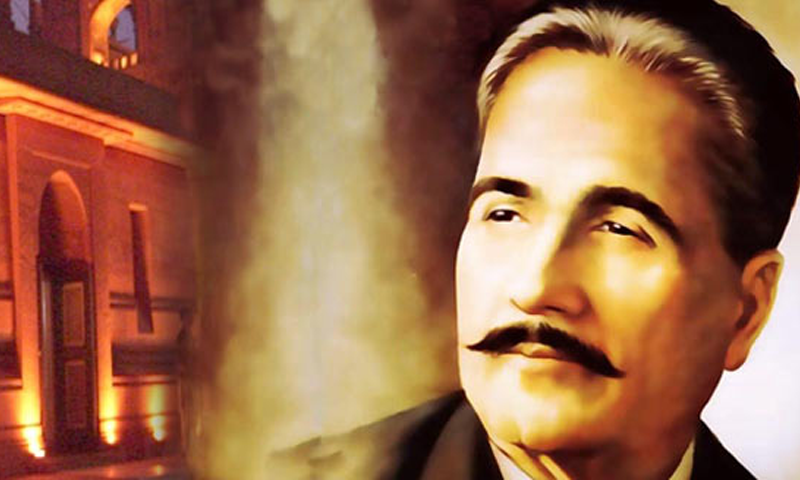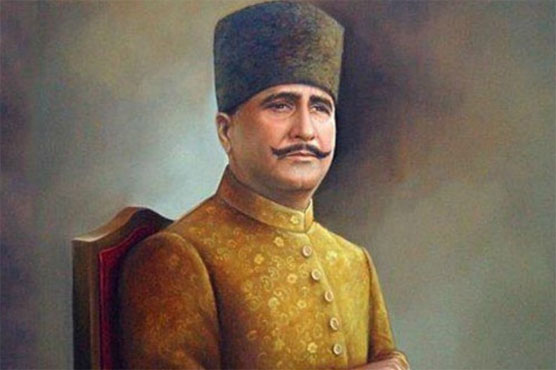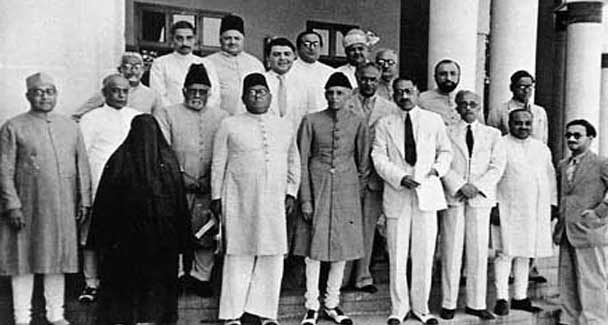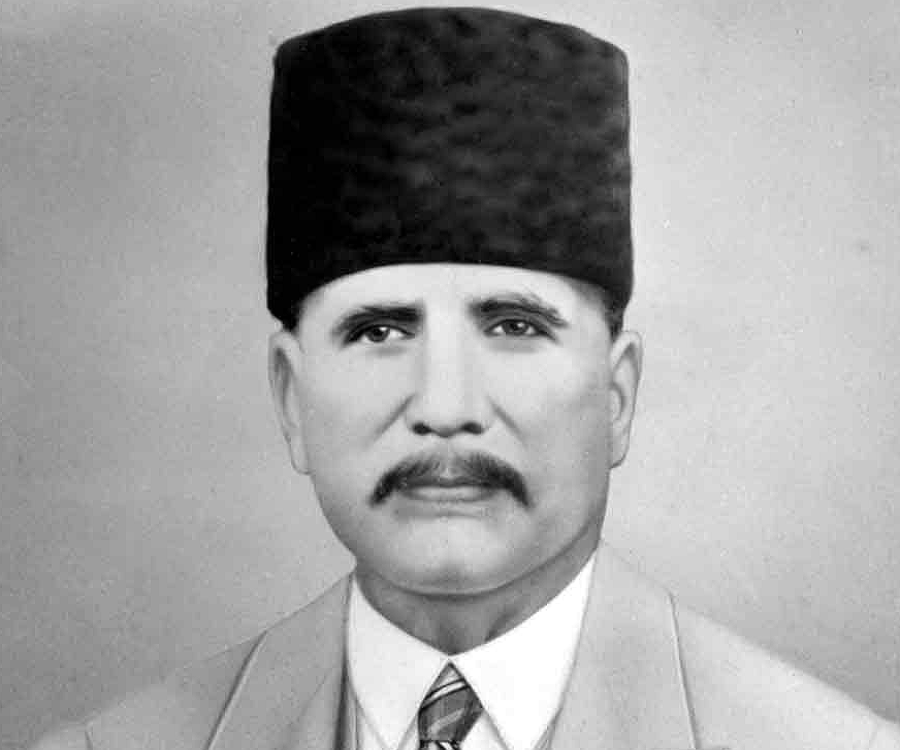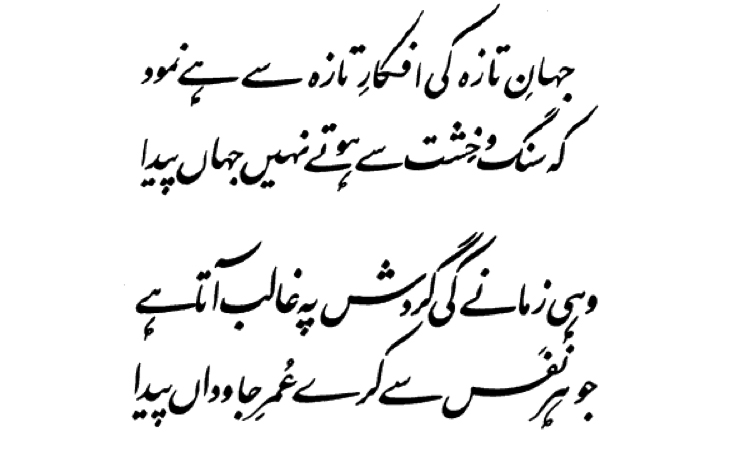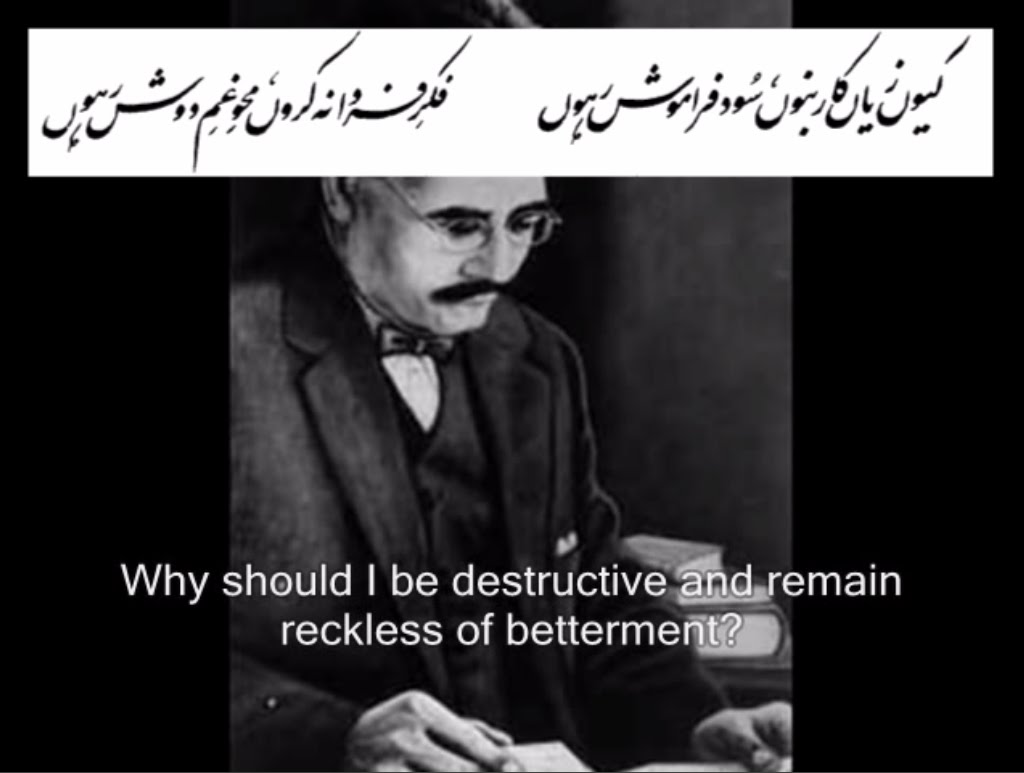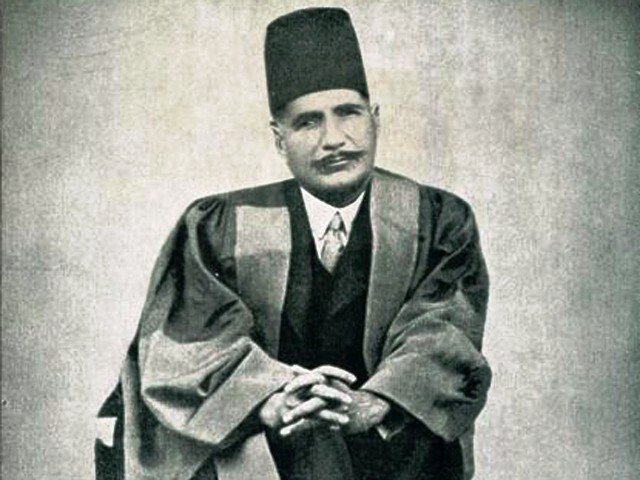1. Introduction
Allama Sir Muhammad Iqbal was an artist, rationalist and government official was born in Sialkot, Pakistan, whose verse in Urdu, Arabic and Persian is thought to be among the best of the cutting edge time and whose vision of a free state for the Muslims of British India was to move the making of Pakistan. He is usually alluded to as Allama Iqbal, Allama signifying “Researcher”. Let us discuss all about Allama Muhammad Iqbal here. Iqbal was a solid defender of the political and profound recovery of Islamic civilisation over the world, however specifically in India; a progression of renowned addresses he conveyed to this impact was distributed as the reconstruction of religious thought in Islam.
Iqbal’s dad, Shaikh Noor Mohammad, was a tailor, not formally instructed but rather a religious man. Iqbal’s mom Imam Bibi was a pleasant and humble lady who helped poor people and tackled the issues of neighbours. She kicked the bucket on November 9, 1914, in Sialkot. Iqbal adored his mom, and on her passing, he communicated his sentiments of feeling in an idyllic frame elegy. He is accepted to be the motivation behind the verifiable ‘Pakistan Movement’, in which he was one of only a handful couple of pioneers who initially considered the possibility of Pakistan as an alternative country for the Muslims.
Iqbal was an exceptionally learned man who completed a significant piece of his examinations in India and some in England and Germany, where he was acquainted with the methods of insight of Goethe, Heine and Nietzsche. While examining abroad, he turned into an individual from the London branch of the All India Muslim League. Iqbal provided legal counsel in India for at some point in the wake of returning and later entered governmental issues and was known for his lawful mastery, political philosophies and basis and philosophical speculations – he is affectionately recognized as an extraordinary writer and researcher.
2. Childhood and Early Life
Muhammad Iqbal was conceived in Sialkot, in the Punjab Province of British India to Sheik Noor Muhammad and Imam Bibi. His dad was not an informed man and filled in as a tailor while his mom was a homemaker. At 4 years old, Iqbal was acquainted with religious investigations and was sent to the mosque to learn Qur’an. He learnt the Arabic dialect at Scotch Mission College in Sialkot and sought after his transitional from the Faculty of Arts, Murray College. In 1895, Iqbal enlisted in Government College Lahore for his single men’, to consider logic, English writing and Arabic.
Iqbal got the Faculty of Arts recognition from Scotch Mission College in 1895, where his educator Hassan was the teacher of Arabic. Around the same time, Iqbal wedded Karim Bibi, the little girl of a Gujarati doctor Khan Bahadur Ata Muhammad Khan, through a first masterminded marriage. They had little girl Miraj Begum and child Aftab Iqbal.
3. Career
Iqbal took up a right-hand residency at Government College, Lahore, when he came back to India, however for money-related reasons, he surrendered it inside multi-year to specialize in legal matters. While keeping up his lawful practice, Iqbal started focusing on otherworldly and religious subjects and distributing verse and artistic works. He ended up dynamic in the Anjuman-e-Himayat-e-Islam, a congress of Muslim intelligent people, scholars and writers and lawmakers. In 1919, he turned into the general secretary of the association. Iqbal’s contemplations in his work basically centre around the profound heading and improvement of human culture, based on encounters from his movements and remains in Western Europe and the Middle East.
Iqbal completed his Masters of Arts Degree and began his scholastic career as a peruser of Arabic at Oriental College however inside a brief timeframe, he turned into a lesser teacher of rationality at Government College Lahore. Iqbal picked higher examinations in the West and set out to England to think about on a grant from Trinity College, Cambridge, and got his Bachelors of Arts degree from the same in 1906. In 1907, he went to Germany to seek after a doctorate and earned PhD degree from the Ludwig Maximilian University, Munich. Amid the procedure, he got his doctoral proposal ‘The Development of Metaphysics in Persia’ distributed. He came back to India and turned into a partner educator at Government College, Lahore yet the activity did not give enough money related help which is the reason he chose to swing to the act of law.
He honed as a legal advisor from 1908 to 1934. In 1927, Iqbal was chosen to the Punjab Legislative get together and was later chosen to manage the session of the Muslim League. It was in these positions that he for the main, time presented the possibility of ‘Pakistan’. Because of his fizzling wellbeing, Iqbal quit specializing in legal matters by and large in 1934 and was respected with benefits by the Nawab of Bhopal. He devoted his life to his own otherworldly upliftment and adding to the Persian and Urdu writing.
4. Major Works
Iqbal was known for his lawful aptitude and political philosophies, yet it was as an artist that he is still affectionately recalled. With books like, ‘Rumuz-I-Bekhudi’, ‘Zabur-I-Ajam’, and so forth his commitment to Urdu writing is immense. The verse and theory of Mawlana Rumi bore the most profound effect at the forefront of Iqbal’s thoughts. Profoundly grounded in religion since adolescence, Iqbal started seriously focusing on the investigation of Islam, the way of life and history of Islamic human advancement and its political future, while holding onto Rumi as his guide. Iqbal would highlight Rumi in the part of the guide in a significant number of his lyrics.
Iqbal’s works centre around helping his perusers to remember the past wonders of Islamic human advancement and conveying the message of an unadulterated, profound spotlight on Islam as a hotspot for socio-political freedom and significance. Iqbal reviled political divisions within and among Muslim countries, and every now and again suggested and talked as far as the worldwide Muslim people group, or the Ummah. Allama Iqbal’s verse has likewise been converted into a few European dialects where his works were renowned amid the early piece of the twentieth century. Iqbal’s Asrar-I-Khudi and Javed Nama were converted into English by R A Nicholson and A J Arberry individually.
The verse and reasoning of Mawlana Rumi bore the most profound effect at the forefront of Iqbal’s thoughts. Profoundly grounded in religion since adolescence, Iqbal would start strongly focusing on the investigation of Islam, the way of life and history of Islamic human advancement and its political future, and hold onto Rumi as “his guide.” Iqbal would highlight Rumi in the part of a guide in a significant number of his ballads, and his works concentrated on helping his perusers to remember the past wonders of Islamic progress and conveying a message of an unadulterated, otherworldly spotlight on Islam as a hotspot for socio-political freedom and enormity. Iqbal reviled political divisions within and among Muslim countries, and habitually implied and talked as far as the worldwide Muslim people group, or the Ummah.
5. Political Life
While isolating his opportunity amongst law and verse, Iqbal had stayed dynamic in the Muslim League. He didn’t bolster Indian contribution in World War I, and also the Khilafat development and stayed in close touch with Muslim political pioneers, for example, Maulana Mohammad Ali and Muhammad Ali Jinnah. He was a pundit of the standard Indian National Congress, which he viewed as commanded by Hindus and was baffled with the League while amid the 1920s, it was invested in factional partitions between the master British gathering drove by Sir Muhammad Shafi and the moderate gathering drove by Jinnah.
He bolstered the protected recommendations displayed by Jinnah with the point of ensuring Muslim political rights and impact in a coalition with the Congress and worked with the Aga Khan and other Muslim pioneers to retouch the factional divisions and accomplish solidarity in the Muslim League.
6. Personal Life and Legacy
Allama Muhammad Iqbal married thrice. In 1895, while contemplating Bachelor of Arts he had his right off the bat wedding with Karim Bibi, through a masterminded marriage. Karim Bibi was the little girl of general professional Khan Bahadur Ata Muhammad Khan who was the maternal fantastic father of chief and performer Khwaja Khurshid Anwar. They had two youngsters, a little girl named Miraj Begum and a child Aftab Iqbal. From that point forward, Iqbal got married again with Sardar Begum, who was the mother of Javed Iqbal. The third wife he married was Mukhtar Begum.
He passed on in 1938 in Lahore subsequent to affliction for a long time from different diseases, which began with a secretive throat ailment that he created on his outing to Spain and Afghanistan. His tomb was raised in Hazuri Bagh, Pakistan.
7. Literary Works
7.1 Persian
Iqbal’s beautiful works are composed fundamentally in Persian instead of Urdu. Among his 12,000 verses of verse, about 7,000 verses are in Persian. In 1915, he distributed his first gathering of verse, the Asrar-e-Khudi (Secrets of the Self) in Persian. The sonnets underscore the soul and self from a religious, profound viewpoint. Numerous commentators have called this current Iqbal’s finest graceful work In Asrar-e-Khudi, Iqbal clarifies his logic of “Khudi,” or “Self.” Iqbal’s utilization of the expression “Khudi” is synonymous with “Rooh” specified in the Quran. “Rooh” is that perfect start which is available in each individual, and was available in Adam, for which God requested the greater part of the heavenly attendants to prostrate before Adam. One needs to make an awesome voyage of change to understand that heavenly start which Iqbal calls “Khudi”.
A similar idea was utilized by Farid ud Din Attar in his “Mantaq-ul-Tair”. He demonstrates by different implies that the entire universe complies with the will of the “Self.” Iqbal censures implosion. For him, the point of life is self-acknowledgement and self-learning. He graphs the phases through which the Self-needs to go before at last touching base at its purpose of flawlessness, empowering the knower of the “Self” to end up a vice-regent of God.
Rumuz-e-Bekhudi, A man must keep his individual qualities flawless, however, once this is accomplished he should forfeit his own desire for the requirements of the country. Man can’t understand the Self outside of society. Likewise in Persian and distributed in 1917, this gathering of ballads has as its primary subjects the perfect network, Islamic moral and social standards, and the connection between the individual and society. In spite of the fact that he is valid all through to Islam, Iqbal additionally perceives the positive closely resembling parts of different religions.
Iqbal’s 1924 Payam-e-Mashriq, Goethe wails over the West has turned out to be excessively materialistic in viewpoint and expects the East will give a message of want to revive otherworldly qualities. Iqbal styles his work as a suggestion toward the West of the significance of ethical quality, religion and human progress by underlining the requirement for developing inclination, vigour and dynamism.
The Zabur-e-Ajam, distributed in 1927, incorporates the lyrics Gulshan-e-Raz-e-Jadeed and Bandagi Nama. Bandagi Nama censures bondage by endeavouring to clarify the soul behind the expressive arts of oppressed social orders.
Iqbal’s 1932 work, the Javed Nama (Book of Javed) is named after and in a way routed to his child, who is highlighted in the lyrics. It takes after the cases of crafted by Ibn Arabi and Dante’s The Divine Comedy, through otherworldly and misrepresented delineations crosswise over time. Iqbal portrays himself as Zinda Rud guided by Rumi, through different sky and circles, and has the pleasure of moving toward eternality and interacting with divine enlightenment.
7.2 Urdu
First work distributed in Urdu by Iqbal was the Bang-e-Dara. This roused Iqbal to compose ballads on the verifiable and social legacy of Islamic culture and Muslim individuals, not from an Indian but rather a worldwide point of view. Iqbal desires the worldwide network of Muslims, tended to as the Ummah to characterize the individual, social and political presence by the qualities and lessons of Islam.
Iqbal liked to work principally in Persian for a prevalent time of his vocation, however, after 1930, his works were basically in Urdu. Crafted by this period were frequently particularly coordinated at the Muslim masses of India, with a considerably more grounded accentuation on Islam, and Muslim profound and political string. The Bal-e-Jibril is the story where he went by the landmarks and heritage of the kingdom of the Moors. It comprises of ghazals, ballads, quatrains, mottos and conveys a solid feeling of religious passion. Iqbal portrays Rumi as a character and a piece of the secrets of Islamic laws and Sufi observations is given.
7.3 English
Allama Muhammad Iqbal furthermore formed two books regarding the matter of The Development of Metaphysics in Persia and The Reconstruction of Religious Thought in Islam and numerous letters in the English tongue. In these, he revealed his thoughts concerning Persian rationality and Islamic Sufism, particularly, his feelings that Islamic Sufism impels the looking for the soul to an unrivalled perspective of life. He moreover discussed thinking, God and the significance of appeal, human spirit and Muslim culture, and what’s more other administrative, societal and religious issues.
8. Trivia
He is viewed as the ‘Shair-e-Mashriq’ in a large portion of Southeast Asia. He is additionally called ‘Muffakir-e-Pakistan’ and ‘Hakeem-ul-Ummat’. He is Pakistan’s National Poet and his birthday is a national occasion there. He is the creator of ‘Saare Jahan Se Achcha’. In Iran and Afghanistan, he is well known as ‘Iqbal-e Lahori. His child Javid Iqbal filled in as an equity on the Supreme Court of Pakistan. Numerous open organizations in Pakistan are named after him.
9. Death
In 1933, in the wake of coming back from an excursion to Spain and Afghanistan, Iqbal’s wellbeing crumbled. He spent his last years attempting to set up the Idara Dar-ul-Islam, a foundation where ponders in traditional Islam and contemporary sociology would be sponsored and pushing the interest for a free Muslim state. Iqbal stopped specializing in legal matters in 1934 and he was allowed annuity by the Nawab of Bhopal. In the wake of torment for a considerable length of time from a progression of extended ailments, Iqbal passed on in Lahore in 1938. His tomb is situated in the space between the passageway of the Badshahi Mosque and the Lahore Fort.
Iqbal is honoured generally in Pakistan, where he is viewed as the ideological originator of the state. His Tarana-e-Hind is a melody that is generally utilized as a part of India as an energetic tune talking about public concordance. His birthday is every year honoured in Pakistan as Iqbal Day and is a national occasion. For quite a while, Iqbal’s real date of birth stayed debated, with numerous trusting February 23 to be the date of Iqbal’s introduction to the world. On February 1, 1974, a Pakistani government panel authoritatively announced Iqbal’s date of birth to be November 9.
